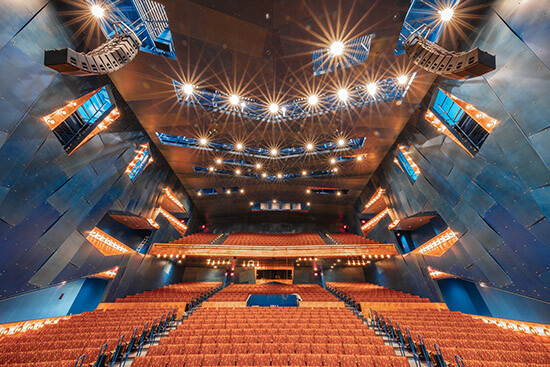Pablo Center Joins National Group Fighting for Independent Venues’ Survival
arts center could lose $1M by summer if shutdown continues

Facing “brutal” financial conditions because of coronavirus-driven shutdowns, 450 venues across the United States – including the Pablo Center at the Confluence in Eau Claire – have formed a new organization to fight for their survival.
The Pablo Center announced Friday that it is a charter member of the National Independent Venue Association, which includes well-known entertainment venues such as First Avenue in Minneapolis, Pabst Theater Group in Milwaukee, Exit/In in Nashville, and hundreds more across 43 states.
As the coronavirus pandemic hit the nation hard, “We were the first to close and likely will be the last to open,” Jason Jon Anderson said of independent entertainment venues. Anderson, executive director of the Pablo Center, said in a telephone interview that his organization will miss out on an estimated $627,000 in revenue through the end of May because of Wisconsin Gov. Tony Evers’ “Safer at Home” order. By July, he said, that figure could grow to $1 million if the Pablo Center can’t begin to sell new memberships and tickets for its third season. At that point, the arts center will have used up its reserves and wouldn’t be able to pay its staff, Anderson said.
“We were the first to close and likely will be the last to open,” Pablo Center Executive Director Jason Jon Anderson said of independent entertainment venues.
Numerous nonprofits and businesses are in the same boat. Legislation that has passed Congress – such as the $2.2 trillion CARES Act – hasn’t necessarily helped entertainment venues because of the nature of their operations. Funds meant to help small businesses continue to pay their employees via the Paycheck Protection Program, which was part of the CARES Act, dried up as of Thursday, April 16. And while Congress gave funds to the National Endowment for the Arts to help arts groups, the NEA is only divvying that money out to entities that have already received NEA grants, which excludes the Pablo Center, which opened less than two years ago.
Fortunately, the Pablo Center qualified for funds through the PPP before that money was depleted. However, the PPP loan will only allow the Pablo Center to pay its staff through June, Anderson said.
“As a building, we qualified for the PPP, which allows us to maintain our employees,” Anderson said. “But we don’t make widgets, we sell tickets, which is based on consumer confidence” and the ability to hold large events – which are prohibited in Wisconsin until May 26 at the earliest.
Anderson is optimistic that the new organization, dubbed NIVA, will be able to provide a united voice for independent venues that typically operate, well, independently. The new group will advocate in Washington, D.C., on behalf of independent venues as future CARES legislation is written.
According to NIVA, “Independent venues and promoters play a vital role in their communities, influencing travel and tourism. They are a part of the fabric, foundation and pride of cities and towns across America.” The group cited a 2016 study by IBISWorld that estimated the live music industry created $23.5 billion in revenue annually.
However, that robust stream was cut off by COVID-19. “It’s just brutal right now, and the future is predictable to no one,” Dayna Frank, NIVA board member and owner of First Avenue in Minneapolis, said in a press release. “We can’t envision a world without these music venues, so we’ve created NIVA to fight for their ability to survive this shutdown, which we hear could go into 2021. Our first order of business is to push to secure federal funding to preserve the ecosystem of live music venues and touring artists.”
“Most of us have gone from our best year ever to a dead stop in revenues, but our expenses and overhead are still real, and many will not make it without help,” said Gary Witt, CEO of Pabst Theater Group in Milwaukee.
Added Gary Witt, CEO of Pabst Theater Group in Milwaukee: “Most of us have gone from our best year ever to a dead stop in revenues, but our expenses and overhead are still real, and many will not make it without help. Our employees, the artists, and the fans need us to act. But we are also an important income generator for those around us, bringing revenue to area restaurants, bars, hotels, and retail shops. Our contributions to the tax base far exceed our ticket sales.”
For his part, Anderson is trying to maintain his optimism despite the tough circumstances. He knows the Pablo Center is better off than many other independent venues nationwide, which have already had to lay off their employees.
“I can’t wake up every day and be doom and gloom,” Anderson said. “I just can't. We’ve got an important mission. … We have time on our side. Other venues do not.”
The Pablo Center at the Confluence is a founding member of Together Chippewa Valley, a fundraising initiative aimed at helping nonprofits in the region during the COVID-19 crisis.
Learn more about the National Independent Venue Association at www.nivassoc.org.






















